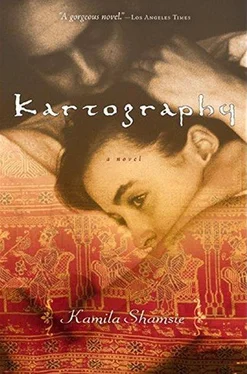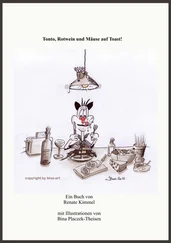‘What’s happened with the two of you?’ Sonia said, but she didn’t need my pain to add to hers, so I told her ‘nothing serious’.
‘You’ll tell me when you’re ready,’ Sonia said, and touched my cheek, almost crumbling my resolve.
Before long we were in narrow gullies. Zia pulled alongside and asked Sonia if she could find her way around here.
‘Is the map man lost?’ Sonia said, smiling in at Karim.
Karim smiled back and said he’d never seen a map of Kharadar and no one he knew could verbally re-create its twists and turns. I knew nothing about Kharadar as it existed in the present, although somewhere in my head was the information that when Karachi was little more than a cluster of huts within a boundary wall surrounded by marshy ground, there were two points of entry to the town: Kharadar (the salt doorway) and Mithadar (the sweet doorway), named after the quality of water in the wells that stood by each door. So this was as Old Karachi as it got.
Sonia directed me through the narrow lanes, with Zia following behind. She was the only one among us not surprised to see that the shops were still open and the streets bustling with activity, though it was near midnight and most of Karachi had shut down for the night.
A woman was buying a plush animal from a shop that had dozens of toys, individually stored in plastic bags, hanging from hooks outside the store, forcing people walking along the narrow pavement to duck and weave out of the way of footballs, teddy bears, dolls and plastic cricket bats. Through the open door of a travel agency I saw a group of men sitting in a ragged circle with their feet up on a table; further ahead, a sheep poked its nose through the door that stood ajar to a video-game arcade, if arcade is not too elaborate a term for a tiny enclosure with space for only three games. A crowd of children stood around a man who fed long, yellowy sugar cane into a press on a rickety cart and filled old Coca-Cola and 7-Up bottles with sweet liquid. Piles of flattened canes were stacked on the road beside him.
I was moved, absurdly, to tears. A week or two ago people were wary of leaving their houses, particularly after dark, the violence in the city both unpredictable and terrifyingly ordered, causing some to speculate that the factional violence, ethnic violence, sectarian violence and random violence were not unconnected but fuelled by someone who wanted Karachi terrorized. But who? Why? No one was sure, though there was no shortage of theories. We all knew it would start up again — the shootings on a massive scale, the unnatural silence in the evenings, the siege mentality — but for the moment, for today, Karachi was getting back to its feet, as it had always been able to do, and that didn’t just mean getting back to work, but getting back to play: friendship, chai, cricket on the street, conversation. It was a terribly self-involved thought, I knew, but I couldn’t help feeling that, in the midst of everything that was happening, Karachi had decided to turn around and wink at me. And in that wink was serious intent: yes, the city said, I am a breeding ground for monsters, but don’t think that is the full measure of what I am.
Sonia told me to pull over next to a paan shop; Zia parked next to me, and we walked together to a chai shop. There didn’t appear to be any female customers, but no one gave us a second glance. The interior of the chai shop — confusingly called a ‘hotel’—was fitted with white bathroom tiles and fluorescent lights, as was the norm with such establishments, and our collective aesthetic gave one long shudder and sat us down outdoors, on wooden backless benches around a laminated-top long table, with watery imprints of the bottoms of glasses on it. The owner (at least, he appeared to be the owner because he had a note pad and pencil in hand) snapped his fingers and a man in black shalwar-kameez appeared to wipe the table clean. When he was done, Karim, Sonia and I rested our elbows on the table top, though Zia first removed a handkerchief from his pocket and spread that on the table in front of him. When he saw we were about to laugh he whisked the handkerchief away, and planted his palms on the table with an air of nonchalance. Sonia ordered parathas and four cups of tea ‘with malai’; Zia interrupted, ‘No malai for me.’ He couldn’t bear even the tiniest speck of cream to mix with the milk in his tea.
A beggar girl came and stood by our table with a cupped palm extended towards us.
‘Move away,’ Zia said.
She stood her ground.
‘Are you deaf? Move away. Can’t we drink tea in peace?’
‘Zia!’ Karim remonstrated.
‘Fine,’ Zia said. He pointed at Karim. ‘He’s the one with the money.’
The girl turned to Karim. Sonia nudged him and pointed out the other beggars who were watching with interest to see if he was a soft touch. ‘Come back when we’ve finished,’ he said. The girl continued to stand her ground, blocking Karim’s view of the street. I couldn’t help getting some perverse pleasure from watching him so torn between the moral code that served him so well in the abstract and the terrible irritation of having someone standing so close, pushing her outstretched palm in front of him and mumbling, without conviction, phrases about her sick mother and sick brother and no money for medicine. These were the sort of things he could remain blithely unaware of when he sat in London or Boston, shaking his head in disgust at the tiny circles in which I lived my life.
‘We’re clearly the rich kids around here,’ I said. ‘She’d be a disgrace to her profession if she gave up on you so easily. Guess no one’s ever shown her a map that lets her know her connectedness to you. Guess she isn’t aware of your great, bleeding heart that sees your life in the context of her world.’
‘Sonia, would you tell your friend to stop directing every conversation back to herself,’ Karim said.
‘What’s going on?’ Sonia said. Neither Karim nor I answered, and Zia seemed to be in another world.
The waiter came back to our table, shooing the girl away, and set down four pieces of paper as place mats. They were shipping schedules, detailing lists of Ships, Ports of Call, ETA and ETD, Voyage Number, Flag, Agents and other indecipherables such as: Line Advert, Service, Terminal and EGM. The last column was To Load For (‘sort of like “to die for” but less intense’, Karim said, and I couldn’t believe how much I wanted to laugh at that) and there were a wealth of place names: Riga, Ashkabad, Fos, Beira, Abidjan, Leixoes, Thessalaniki, Stavanger, Limassol, Monrovia, Lomé, Mouakchott, Port Gentile. I’d never before given thought to what it meant to be part of a port city, to leave the imprint of a tea-wet spoon on names of places that preferred coffee, to have these strange and foreign syllables intrinsically involved in the commerce of the place, to look at the man two tables from you and wonder if, for all his lack of external signs of affluence, he knew the word for ‘ocean’ in thirty different languages or the taste of fish cooked in a hundred different spices, and knew too, despite all his travelling, that home meant this alley and these place mats and those different dialects swirling around him. But to admit any of that out loud would be tantamount to saying Karim had a point about me, and I wasn’t going to give him the satisfaction.
The parathas arrived, as did the tea, and I gulped when I saw it. The cream rose entire centimetres above the rim of the cup, more frothy than any cappuccino I’d ever seen, and as we watched it in awe it wobbled. ‘The thing’s alive,’ I said.
Sonia, scooping it up with a spoon, smiled at me and said, ‘What were you expecting? A dribble of single cream?’ I continued to stare at the cup and she said, ‘If you eat it up really fast like ice cream on a hot day with the car window open and wind whooshing through, you might get to the tea beneath; but if you leave it it’ll just go on absorbing tea and expanding, expanding.’
Читать дальше












